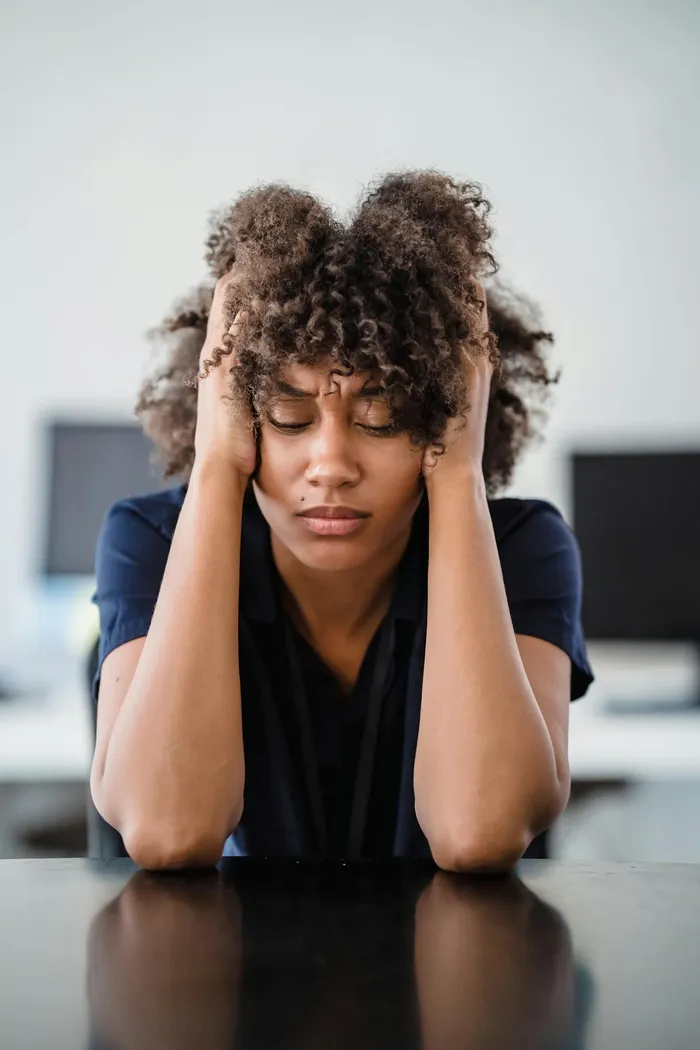Understanding the thin line between burnout and depression on World Mental Health Day

In South Africa, the South African Depression and Anxiety Group (SADAG) has seen more cases of work-related stress, anxiety, and depression, especially among young professionals and caregivers.
Image: Anna Tarazevich/pexels
On World Mental Health Day, October 10, we’re unpacking one of the most confusing conversations of our time: the blurred line between burnout and depression, two experiences that often overlap, but differ in important ways.
As one Reddit user recently put it in a now-viral thread: “I’ve read so many articles saying burnout and depression are different, but the symptoms sound the same: fatigue, body aches and hopelessness.
So how can you tell?”
More people are asking this question as mental health challenges grow worldwide. In South Africa, the South African Depression and Anxiety Group (SADAG) has seen more cases of work-related stress, anxiety and depression, especially among young professionals and caregivers.
Dr Thabo Mogotlane, a specialist psychiatrist and addiction physician at Mediclinic Legae, explains that both burnout and depression can make life feel dull.
While they share symptoms like fatigue, irritability and emotional distress, their causes and treatments are often different. Burnout is primarily driven by external factors such as an overwhelming workload, lack of control in the workplace, and a conflict of values.
He explains that burnout is primarily caused by chronic, unmanaged stress, typically associated with work or caregiving roles. “It’s the body and mind’s way of saying, ‘I’ve had enough.’ It tends to improve when stress is reduced or boundaries are strengthened.”
Depression, on the other hand, isn’t just about what’s happening around you. It’s a more profound and pervasive condition influenced by genetics, brain chemistry, and psychological factors.
“A hallmark of depression is persistent sadness or emptiness that lasts for weeks or months, often accompanied by a loss of interest in things that once brought joy,” says Mogotlane.
To put it simply, burnout is like your mind’s alarm system, warning you to slow down. Depression, however, is the ongoing struggle that continues even after the warning signs have faded.
Despite one-third of South Africans experiencing a mental health condition and more than 27% of South Africans affected by depression, only 5% of the national healthcare budget is allocated to mental health services.

Despite one-third of South Africans experiencing a mental health condition and more than 27% of South Africans affected by depression, only 5% of the national healthcare budget is allocated to mental health services.
Image: Mizuno K /pexels
The rise of the modern meltdown
Today, mental exhaustion is more common than ever. Remote work has a mixed home and office life. The push to always be productive has made exhaustion seem normal. Plus, the need to always be present online leaves many people feeling tired and not good enough.
The 2024 Sapien Lab Mental State of the World Report revealed that South Africa, with a mental health quotient of 50, ranks 69 out of 71 countries and has the greatest percentage of distressed or struggling respondents at 35%. One third of South Africans suffer from a mental health condition, yet the majority do not seek help.
Spotting the signs and knowing when to act
While the two often overlap, understanding their differences can be crucial in obtaining the right help. Burnout often feels like emotional and physical exhaustion tied to external factors, usually work.
Burnout often develops gradually and shows up as:
- Emotional exhaustion and mental fog.
- A sense of cynicism or detachment from work.
- Physical fatigue and body aches.
- Feeling unproductive or ineffective.
Meanwhile, depression tends to involve deeper, more pervasive symptoms, such as: Depression lingers regardless of circumstances. Even when you're on holiday or spending time with loved ones, the weight doesn't lift.
It can bring sadness, loss of pleasure, changes in sleep or appetite and sometimes thoughts of hopelessness.
However, engaging in small, evidence-based mood-lifting actions, such as taking a brisk walk outdoors, can counter hopelessness and foster a sense of possibility.
- Persistent sadness or emptiness lasting two weeks or longer.
- Loss of interest or pleasure in activities once enjoyed
- Changes in sleep, appetite, or energy
- Feelings of guilt, worthlessness, or hopelessness
- Difficulty concentrating or making decisions
“Certain groups are more at risk of a misdiagnosis, like healthcare workers, teachers, students or anyone juggling multiple roles, adds Mogotlane. "It’s also possible to experience both simultaneously, and one can trigger the other.”
A simple rule of thumb? If stepping away from work or taking a break leads to improvement, it’s more likely to lead to burnout. If the feelings persist despite rest, it might be depression, and professional help is crucial.
“Concepts like ‘self-care’ and ‘work-life balance’ have entered mainstream discussions,” says Dr Mogotlane. Self-care acts as a powerful leverage against burnout and mental health challenges by building resilience, managing stress, and improving overall well-being.
Rather than being a selfish indulgence, it is a proactive and necessary practice that restores your physical, emotional, and mental resources.
And quality self-care is linked to improved mental health, with benefits like enhanced self-esteem and self-worth, increased optimism, a positive outlook on life, and lower levels of anxiety and depression.
Recovering from burnout or depression begins with recognising that you don’t have to “push through” alone.
For burnout, lifestyle adjustments like rest, boundary-setting, mindfulness, and therapy can be effective in restoring energy and perspective. For depression, treatment may include a combination of therapy, medication, and structured support from mental health professionals.
For South African readers, the South African Depression and Anxiety Group (SADAG) offers a 24-hour helpline on 0800 567 567.
Related Topics: